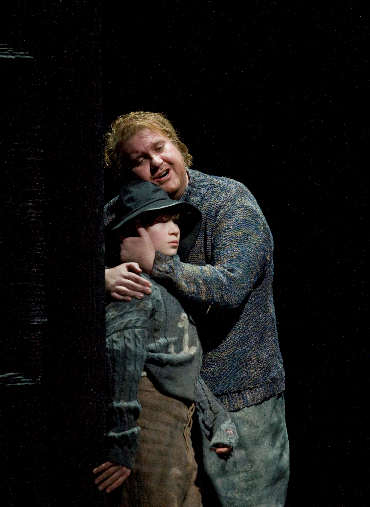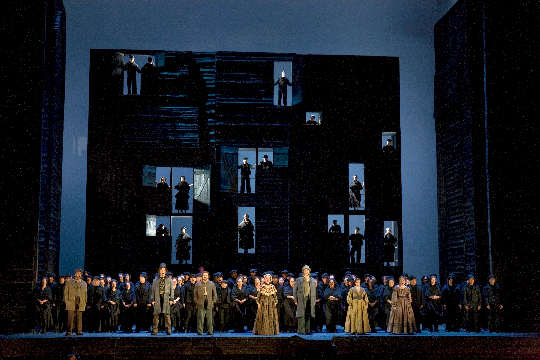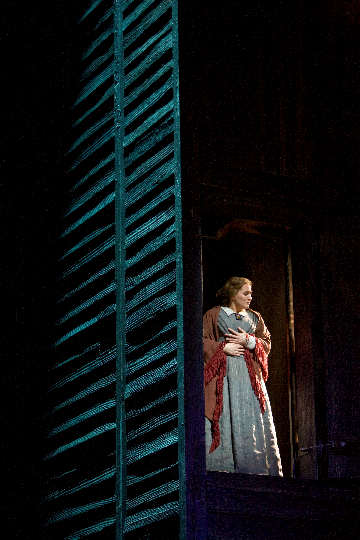Other Links
Editorial Board
- Editor - Bill Kenny
- London Editor-Melanie Eskenazi
- Founder - Len Mullenger
Google Site Search
SEEN
AND HEARD INTERNATIONAL OPERA REVIEW
Britten: Peter Grimes
(new production premiere):
The Metropolitan Opera and Chorus,
Soloists, Donald Runnicles (conductor), John Doyle (production),
Scott Pask (set designer), Ann Hould-Ward (costume designer),
Peter Mumford (lighting designer), Donald Palumbo (chorus master),
New York, 28.2.2008 (BH)
Having a crowd stare at you for three hours is unnerving, and that
awkward—and powerful—image is at the heart of the Met's new
production of Peter Grimes, brilliantly conceived by
director John Doyle. What at first seems a handicap—the huge Met
chorus having little space to maneuver in front of designer Scott
Pask's enormous wooden wall—eventually becomes a strength, as over
and over the cast delivers their lines while glaring out into the
audience. The cast is as trapped in their environment as Grimes
is. Near the end, when the townspeople line up downstage and belt
out "Peter Grimes!" it chills to the bone; somehow this crowd is
after you. Doyle got it right: it's an evening of constant
accusation.
The first act has little in the way of action," and the blocking
consists of the crowd generally bunched in the center of the
stage. But by Act II Doyle's idea becomes uncomfortably clear:
Grimes is increasingly trapped in an enormous labyrinth of forces
well beyond his control. Windows and doors in the wall magically
open without a sound, revealing people standing, gazing out in
silent judgment, their ultimate intentions unknown. While I'm the
last person to encourage opera casts to simply stand in one place
and sing, here the idea works, with the cast functioning more like
members of a jury box.
Racette almost anchors the production, providing humanity and
heartbreak, and her big scenes—"Glitter of waves" in Act II and
the famous "Embroidery" scene in Act III—not only show her
lustrous voice but her piercing acting skills. Anthony
Michaels-Moore is equally astonishing as Balstrode, wanting to
offer Grimes consolation but ultimately forced to take other
measures. Fine work by Greg Fedderly as a drunken Bob Boles,
Bernard Fitch as the pious Rev. Adams and newcomer Teddy Tahu
Rhodes as a memorable Ned Keene all help etch a gorgeously sung
landscape.
Britten:
Peter Grimes (new production
premiere)
Conductor:
Donald Runnicles
Production:
John Doyle (debut)
Set Designer:
Scott Pask (debut)
Costume Designer:
Ann Hould-Ward (debut)
Lighting Designer:
Peter Mumford
Chorus Master:
Donald Palumbo
Cast:
Hobson:
Dean Peterson
Swallow:
John Del Carlo
Peter Grimes:
Anthony Dean Griffey
Mrs. Sedley:
Felicity Palmer
Ellen Orford:
Patricia Racette
Auntie:
Jill Grove
Bob Boles:
Greg Fedderly
Captain Balstrode:
Anthony Michaels-Moore
Rev. Horace Adams:
Bernard Fitch
Two nieces:
Leah Partridge (debut), Erin Morley
Ned Keene:
Teddy Tahu Rhodes (debut)
Boy:
Logan William Erickson

Peter Grimes: Anthony Dean Griffey and the Boy: Logan William
Erickson
At the heart of Pask's magnificent set design is the hulking front
wall, towering the complete height and length of the Met stage,
and built from rough, dark wood shingles modeled after huts used
by fishermen on the coast of England to store nets and fishing
tackle. I couldn't help but wonder if Pask admires the black wood
landscapes of sculptor Louise Nevelson. Equally essential is
Peter Mumford's lighting: when the wall slowly retreats, the glow
from above casts shadows, like moonlight splashing the shingles as
they come into view. Near the end, when Grimes is almost squeezed
between two buildings, the light hits the top edges, only
emphasizing the now impossible depth to which he has fallen.

The Set
Musically, I doubt anyone could ask for a more incisive traversal
of the score, conducted with sweeping confidence by Donald
Runnicles, and executed with great precision by the Met Orchestra
(whose members applauded the conductor during the ovations). The
orchestral interludes are presented with very little stage action
or embellishment, other than subtle lighting changes washing
across the wooden slats, and it's a good call: sometimes "only" a
sunrise is all that is needed. With gorgeous phrases flying
throughout the house like sea spray, there's nothing needed to
distract viewers from Britten's evocative mini-tone poems.
(Moreover, perhaps this will further encourage behavior changes in
some opera fans that feel that when no one is singing,
conversation is acceptable.)
So many cast members stand out it is hard to know where to begin.
Even smaller roles are ardently sung, such as Dean Peterson's
Hobson and John Del Carlo's lawyer Swallow, first in line in the
excellent cast. Felicity Palmer, whom I last saw clawing through
the floor in Tchaikovsky's The Queen of Spades, is like the
nosy neighbor you never want, always in your business and never to
your benefit. Jill Grove makes a winsome Auntie, and is part of
the extraordinarily haunting quartet in Act II, with the two
nieces (Leah Partridge and Erin Morley) and Ellen Orford, in a
dramatic turn by Patricia Racette.

Ellen Orford:
Patricia Racette
But the production ultimately rests on the title character, and
the superb Anthony Dean Griffey offers not only a complex
character, not easily fathomed, but couches it in some of the most
lyrical tenor work one is likely to hear this season. Griffey
makes Grimes' fate feel pre-ordained by forces larger than his
capacity to understand, much less overcome, and as a friend said,
he also seems more than a little hotheaded and crazy, to boot.
When he roughs up his new apprentice, played with cowering fear by
Logan William Erickson, it's actually a bit scary seeing him hurl
the boy into a corner. Or when Grimes sings the magnificent "Now
the Great Bear and Pleiades," let's face it: he basically
interrupts what appears to be a cracking good time in the pub,
dampening the mood with his soulful philosophizing. And if Grimes
didn't actually kill his apprentices, are their fates
coincidences? Just bad luck? Is "hanging around with Peter"
automatically a death sentence? Griffey's portrayal won't allow
any neat conclusions.
The members of the Met Chorus, increasingly agile and accurate,
are just sounding more marvelous every month under Donald
Palumbo. Britten has composed a chorus-heavy opera, and whether
in the intricate "Old Joe has gone fishing" or in the
aforementioned climax, the sheer power of the group carries the
music aloft like great oceanic winds. Doyle's vision deliberately
doesn't probe deeply into the psyches of the townspeople; they are
specks, tiny insects swept up by forces larger than they can
comprehend. Ann Hould-Ward's handsome costumes, in shades of
black, brown and gray, discourage treating them as individuals.
Their emotions are at nature's beck and call; the ocean and
weather rule their lives. These may be not literal fishermen but
figurative ones, and the opera may work even better as allegory.
Doyle seems awestruck by this possibility, and encourages us to
view it in the largest, most disturbing sense.
The opera's final scene will no doubt baffle some: after Grimes
has gone out to sea for the last time, the townspeople and cast
assemble downstage. Behind them the towering partitions glide
away to reveal a white-lit back wall and a large modern steel
structure with catwalks, upon which dozens of people in
contemporary dress pose, like silent slackers. (Or as one person
I overheard said, "An ad for the Gap.") Maybe I'm too charitable,
but I cut Doyle some slack here: their appearance and silence
acknowledge that Grimes's predicament is one encountered by
someone of every generation, and offers scant reprieve from the
idea that in some way we are all complicit.
(The Met's broadcast of
Peter Grimes will be on Saturday, March 15. More
information
here.)
All pictures
© Ken Howard
Back
to Top
Cumulative Index Page
